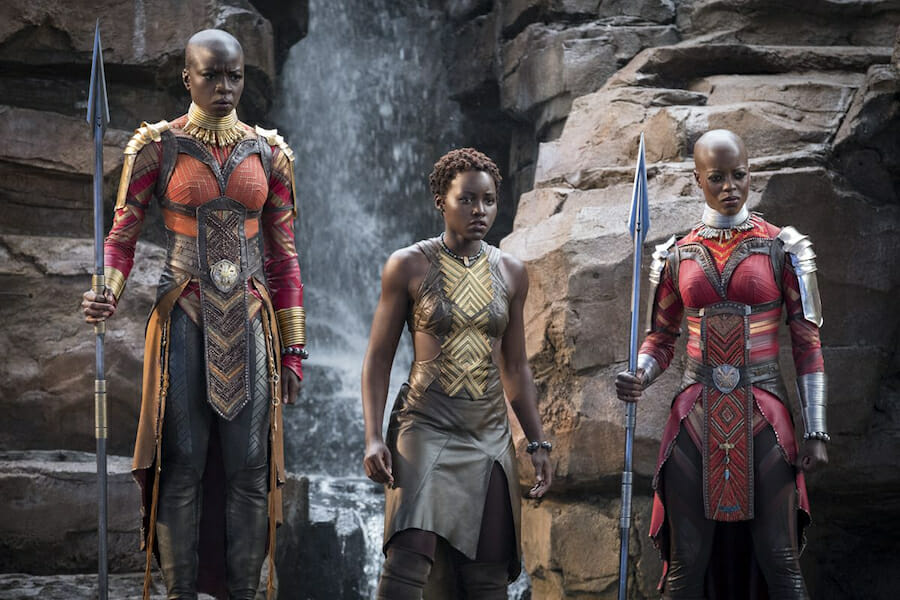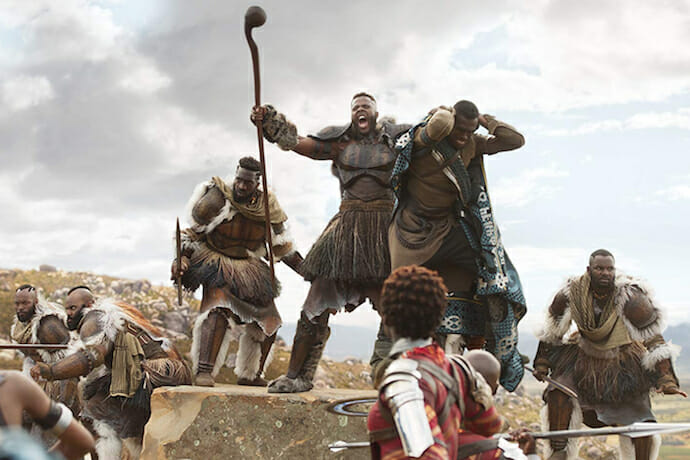
The Liberation Politics of ‘Black Panther’
As countless critics, historians, activists, and comic fans have already noted, Black Panther is an iconic piece of art that has transcended the movie world and captivated audiences all over the globe, not just in the United States. As with every major piece of popular culture, the film carries unavoidable political undertones that are perfectly timed given our current place in world history. At a time when the #BlackLivesMatter movement has been propelled to the top of political discourse in society, and as the issues of inequality and racial justice have been brought to the forefront, Black Panther is perhaps the most timely movie of the year. The celebration of a film with a black cast and black director depicting such profound Afrofuturism is in itself a remarkable achievement, especially in these times.
Throughout the film, Panther does an exceptional job of handling race issues and how the West has historically treated Africa. Early on in the film, T’Challa states that, “if the world found out what we truly are, what we possess, we could lose our way of life.” Intended or not, that line in essence sums up the story of how Western nations have treated Africa. Through colonialism and slavery and even now through foreign policy and corporate plundering of natural resources, the West has ravaged Africa.
With Wakanda being such an advanced technological civilization, one has to wonder if this is not a subtle invitation to ask ourselves what African countries might be had they not endured colonization, the slave trade, modern warfare, and regime change such as in Egypt and Libya. When we first meet Nakia in the film, she is attempting to foil an undercover human trafficking ring in Nigeria. Again, while produced through the medium of a fictional land of a fictional comic book character, the political undertones that director Ryan Coogler paints are all too real in the continent of Africa.
The early challenges to T’Challa as he sought to become the next king in many ways represents the struggle within the black liberation movement. In the US, though ultimately united behind the same cause, the rivaling camps of Martin Luther King and Malcolm X represent different paths the movement could’ve taken. Every liberation movement inherently has along with its ultimate struggle, an internal struggle between its members. Whether it was the pragmatism of Susan B. Anthony versus the radicalism of Alice Paul, every struggle for liberation seems to carry this common theme. In comic books, the battle for a particular mantle is also a common trope, from the battle to become the new Batman in a “Battle for the Cowl” to the battle between Diana and Artemis for the Wonder Woman title in “The Contest.”

In this particular case however, what we get is a much more nuanced representation of internal struggle within a liberation movement through the medium of a superhero movie. Perhaps the biggest point of controversy, one that most casual moviegoers and popcorn lovers likely did not notice, is the way in which agent Everett Ross is portrayed. In much the same way some women objected to how Steve Trevor seemed to take away from Diana, essentially making her dependent on a man in Wonder Woman, the subject has been raised by some as to the extent to which making a CIA agent a ‘good guy’ in the film, while seemingly making ‘black radicalism’ the antagonist, was a good move. To those not familiar with the comic books, it’s easy to make this critique, just as it was easy to critique the romance trope between Diana and Steve in Wonder Woman.
To that extent, though marketed toward a mass audience, comic book movies are inherently an insider’s game. Those not familiar with the history of Wonder Woman comics, would not likely have known the history of Steve Trevor and how integral he has been throughout her literary history. The same goes for Killmonger and Black Panther.
Nonetheless, this critique remains valid. What does it say about a film seeking to champion black liberation if it ultimately seeks to denigrate black radicalism while uplifting the American intelligence community and incorporating a ‘white savior’ motif into the movie? Considering that the CIA has been responsible for overthrowing democratically elected governments around the developing world, and given the FBI’s long track record of hunting down the actual Black Panther Party in America, perhaps the use of Ross in the film was not the best move given the political messages the film attempts to convey. Again, while the film was merely appealing to the canonical history of the comic series, the question remains as to why the black radicalism offered by Killmonger is seen as the villain.
While Killmonger’s views and visions of Wakanda are much more in line with the views of Malcolm X and W.E.B. Du Bois, the film casts that strand of the movement as ‘villainous,’ while heralding the more naive and pragmatic approach, in part led by a white agent of a community that has in part made its living destroying nations of color and stamping out civil rights. Ironically, in a movie designed to show off black culture and promote black liberation, the only genuine vehicle for attaining such is made the antagonist of the movie. In many ways, this echoes the Dark Knight trilogy and the reality that even though both the Joker and Bane are presented as the villains in second and third installments, they ultimately held a much firmer grasp of reality than the white billionaire, Bruce Wayne. Everything Bane said in regards to inequality and oppression was spot-on. In both Nolan’s Dark Knight and Coogler’s Black Panther, the audience is presented with sympathetic villains that are in the end very hard to root against and in ways force the audience to root against their own self-interest.
Regardless of the critiques one may have of Black Panther, the historic achievement of the film cannot be denied. Like with Wonder Woman and the CW shows Supergirl and Black Lightning, the very fact that young girls and young children of color can now grow up and see superheroes that look like them on the big and small screen is something well worth applauding. No doubt Coogler’s masterpiece will continue to spark discussion of black rights and liberation and race relations in this country and around the world for many years to come.
